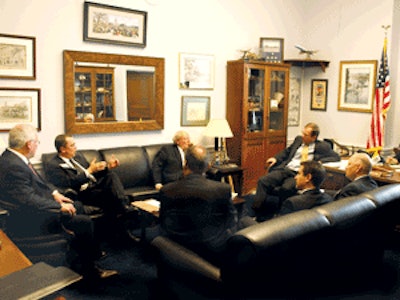
Many top-level executives from across the industry recently visited Washington to meet with their Senators and Congressmen to urge action on issues important to the industry at large. The biggest issue was ethanol.
In office after office, industry executives buttonholed their elected representatives and made the case that the federal government made a mistake in embarking on the program to encourage the use of corn-based ethanol by imposing a mandate, handing out subsidies, and protecting the domestic ethanol industry through a tariff on imported ethanol.
The reception varied. Some members of Congress were very supportive and promised to sign on to legislation to begin to unwind the ethanol program. Others were polite but obviously unwilling to take action.
Another side to ethanol
For a few, however, this seemed to be the first they had heard that there is another side to the ethanol picture. Clearly some thought that using ethanol is unburdened by impacts on other sectors of the economy.
I think we made some progress in getting elected representatives to understand that the diversion of feed grains into fuel is causing huge problems.
Among the points our members made were:
Impact on food costs - Because of the voracious demand from the ethanol sector, the price of corn has skyrocketed, going from around $2.50 per bushel just two years ago to more than $6.00 today. As a result of rising feed grain prices, the broiler industry will spend $6 billion dollars more on feed in 2008 than it would have under 2006 prices. These higher costs will inevitably be passed on to consumers nationwide.
Impact on jobs -While the ethanol industry has created a few jobs, primarily in the Midwest, it is destroying jobs across the country as meat and poultry companies close facilities and cut back production in response to higher costs. About 3,000 jobs in meat and poultry production alone have been eliminated so far in 2008 because of the high input costs imposed by ethanol production.
Little impact
In 2007, one-quarter of the corn crop went into ethanol, and this replaced only one percent of our petroleum consumption.
Our members urged specific action on Congress: reduce or eliminate the tax credit for ethanol added to gasoline and the tariff of $0.54 per gallon on imported ethanol. The Renewable Fuel Standard (RFSthe "ethanol mandate") should also be revised or dropped.
We also asked for support of petitions to waive the mandate. One such petition is before the Environmental Protection Agency, and we hope that others will be filed. The process provides a very good opportunity for people and companies to go on the record in favor of reform of the ethanol program.
The Farm Bill actually reduced the tax credit from $0.54 to $0.45 per gallon, a small step in the right direction, but too small to prove meaningful.
We must keep pushing for more significant change in the program. If you haven't written to your Senator and member of Congress yet, please do so now. The future of your business may depend on it.

















